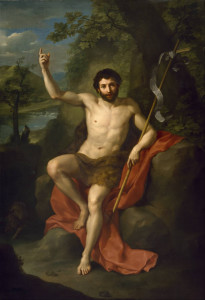Thoughts on Today’s Lessons for Dec. 4, 2016

John the Baptist Preaching in the Wilderness, oil painting on canvas by Anton Raphael Mengs, 1760s. Museum of Fine Arts, Houston.
Repent! We hear an Advent call to repent and await the Messiah in our readings this week. Don’t think of “repent” in its modern definition of deep regret and remorse, though. Hear it rather in its ancient sense as “change one’s mind” in New Testament Greek, or “turn back” in Old Testament Hebrew. If we are on the wrong path in our relationships with God and our neighbors, now is the time to turn back and watch for the light of God’s Kingdom. Isaiah envisions a time when the Messiah, the descendant of King David (whose father was named Jesse), will reign from Zion’s Holy Mountain, where justice will prevail for the poor and the meek.
The Psalmist seems to draw from the same wellsprings as Isaiah in this hymn that may have been composed in memory of the crowning of King Solomon. We call for a just and righteous king who will rule fairly. We call for a king who will bring prosperity to all the people; a king who will take special care to provide for the poor and the oppressed; a king who will reign as long as showers water the earth; a king who will bring peace on earth as long as the moon shines. This is a Messiah devoutly to be wished.
Second Reading: Romans 15:4-13
Paul wrote his letter at a time when all of Rome’s Jews, who had been banished to exile for a decade by the Emperor Claudius, were finally able to come back home after the emperor died. There was tension in the young church as returning Jewish Christians rejoined Christian communities that had become entirely Gentile. Paul devots much of the letter assuring both communities that they are all one in Christ. In today’s reading he cites the prophets, including Isaiah’s Root of Jesse, as foretelling Christ as the king of all humanity, the hope of Jew and Gentile alike.
Gospel: Matthew 3:1-12
Today we meet John, the cousin of Jesus, now an adult and – as his father, the temple priest Zechariah, had foreseen – a great prophet in the spirit of Isaiah and Jeremiah. John is a loud, angry prophet indeed, dressed in camel’s hair and eating locusts and honey, calling on the people to be baptized in the Jordan river as a sign of their repentance from sin. In these verses, indeed, John invokes Isaiah to declare himself the prophet who would cry out in the wilderness to prepare the way of the Lord, a Messiah who will throw away the old traditions, baptizing not with mere water but the fire of the Holy Spirit.
